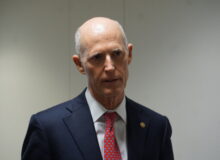By Quin Hillyer at The Washington Examiner;
Sen. John McCain on Tuesday in the Senate gave one of the great speeches of American history. Its content was an almost perfect distillation of the career-long themes of this remarkable, infuriating, courageous, temperamental, wise, headstrong, indefatigable patriot.
McCain has always seemed to operate according to an internal logical consistency whose existence few could doubt but even fewer could fully fathom. The logic’s premises all seem to reside in a five-dimensional Rubik’s Cube, its colored tiles always shifting around, inside McCain’s mind and psyche.
What is discernible in this enigma, indeed obvious, is that the logic’s lodestar, the lodestar of McCain’s very existence, is an almost heart-breakingly deep love of his particular country – not because it is his country, but because it is a noble one. But beyond that, an observer could guess wrong a thousand straight times as to which combination of love and anger, canniness and openness, momentary passion and far-sighted sagacity would manifest itself in his behavior.
But this speech, this raw but contemplative message to colleagues and countrymen, contained the clearest and most accessible exposition of McCainism imaginable.

It is a “privilege,” he said, “to play a small role in the history of the country I love.” He paid homage to senators “who played much more than a small role in our history, true statesmen, giants of American politics.”
Men and women like these often had disputes that were “sharp and heartfelt,” but “they had an obligation to work collaboratively to ensure the Senate discharged its constitutional responsibilities effectively.”
Assuming an underlying commitment to principle, McCain rightly identified the two keys to such statesmanship as 1) willingness to compromise on means and lesser ends in order to… 2) make “incremental progress.”….
[For the rest of this column, which, whether or not it succeeds on its own terms, is at least one of the most carefully crafted ones I have produced in ages, please read here. Whatever you think of McCain, his civics lesson here, and his (not my own) key closing thoughts, are worth saving for the ages.]
…………………………………………………
One other note from Quin: The column excerpted above was written nearly a full day before Sen. McCain’s vote against sending a “skinny repeal” health care bill to a Conference Committee, which was a vote that so infuriated many people that they are loathe to give him any credit or praise for his excellent floor speech from several days earlier. Let me just note these thoughts on that vote by McCain:
I myself would have voted “yes” to keep that bill alive, rather than the “no” vote that McCain cast. But it would have been a close call. The bill as it existed was a mere shell of legislation, a pathetic excuse for a vehicle to keep Obamacare-replacement alive in hopes that somehow a Conference Committee could, behind closed doors, have produced something actually worthwhile.
But as McCain said in his floor speech described in the column above, and as I also have argued for months, what really should have happened all along was the full committee process with open hearings, an invitation for two or three moderate Democrats to come on board, and a massive attempt to actually explain to the American people what the reformers are trying to accomplish and how it would provide a better system. In other words, the usual bill-writing process, what’s known as “regular order,” should have been used all along, in conjunction with better attempts to persuade the public.
Although we’ve lost more than half a year while trying the top-down, closed-door process that now has failed — which is why, reluctantly, I would have tried to save this attempt by going to Conference Committee, because time’s-a-wasting — there is something to be said, something very good, for pulling the plug on this sham. What this means is absolutely not that health-care reform/Obamacare replacement is dead. What it means is that the Senate now must go back to the drawing board, using regular order, and this time perhaps actually produce something worth passing.
That is the actual import of McCain’s vote: a return to regular order that is both fairer to all sides and that is more likely than not to produce legislation that better serves the American public. There is nothing wrong, nothing at all, with McCain making such a prudential decision. It was an honorable decision, even though most conservatives, myself reluctantly included, would have made the other decision and rolled the dice on a Conference Committee. The vituperation being sent McCain’s way is unjustified. Indeed, some of the same conservatives who had conniption fits when the House was pushing a much better, much more useful bill through to passage in order to “give the Senate something to work with,” because the conservatives demanded much fuller and more perfect “repeal,” are now the ones blasting McCain for killing this sham, this embarrassment, of a much-worse shell of a bill than the one they said the House should never pass. The hypocrisy of these conservatives is astonishing. The patriotism and principle of McCain is undiminished.
I strongly opposed McCain in the 2008 primaries. I am far from being a “McCainiac.” But credit is due: What McCain did with his vote was thoughtful, and fully in accord with his stated principles. And it might end up being the single best impetus yet for development of a market-based health-policy bill that actually makes people proud, that commands support from the American public, and that passes both chambers of Congress and actually becomes law. It could prove to be one last, great, successful service from John McCain to the country he loves. — Quin






